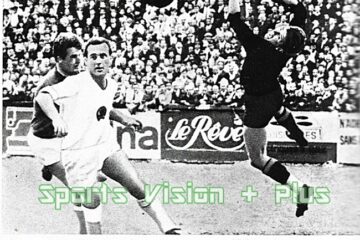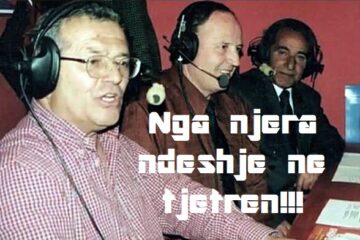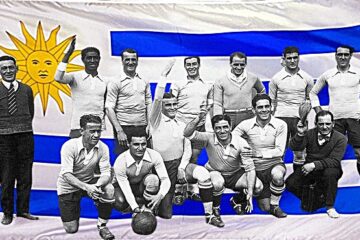1967 | The Battle of Montevideo between Racing and Celtic!
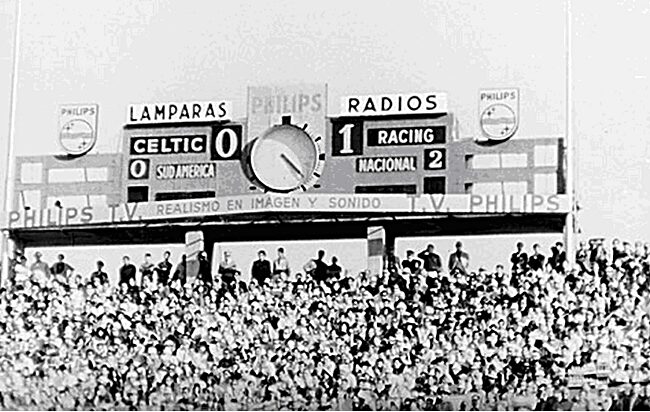
Different stories from the International Cup!
(today: FIFA Club World Cup)
‘World triumph in three games. The achievement of Racing, which will never be repeated in similar circumstances, will stay in history as a unique and unforgettable feat.
Campeon del Mundo – Champions of the World.
The Argentinian media gleefully celebrated the victory of Racing Club over Celtic in the 1967 Inter-Continental Cup Final, a competition in which the European champions played off against the champions of South America for the world crown. It was the first time in the tournament’s eight-year history that an Argentinian team had triumphed and media, pundits and politicians alike in Buenos Aires rushed to heap praise on the team from the capital’s port district of Avellaneda. It was the country’s greatest football success to date. Yet one national newspaper, Clarin, expressed unease at the way that Racing had won the title: ‘Racing took the illicit road to victory. They brought back the cup, but that was all.’
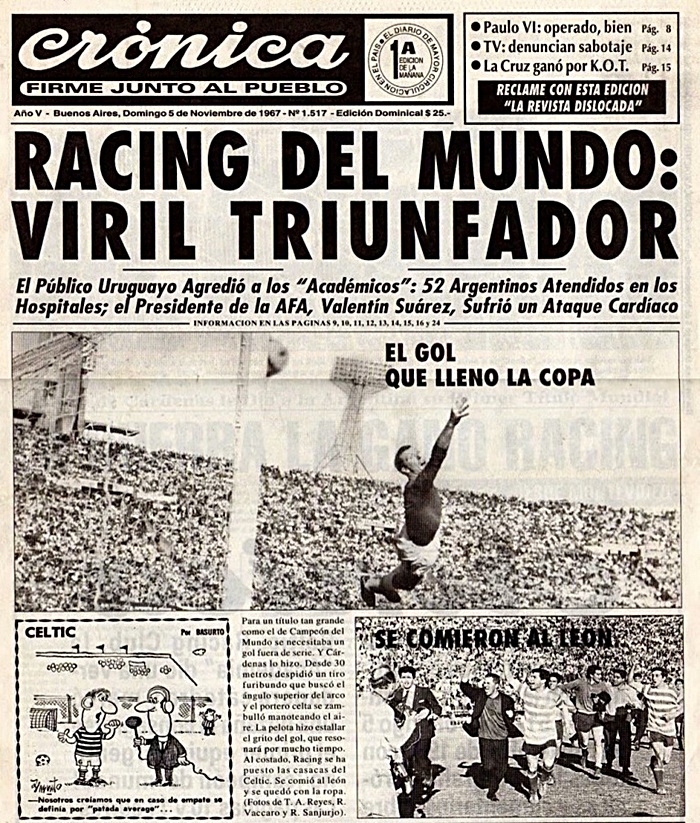
1 –
Argentinian football did not enjoy a positive reputation in Europe at the time. At the previous year’s World Cup, 1966, England manager Alf Ramsay had branded the Argentinian national team ‘Animals’ following a violent quarter-final encounter – and he refused to allow his players to swap jerseys at the game’s end.
The tactics deployed by Racing over the course of the three games against Celtic (with a deciding tie being held in the Uruguayan capital of Montevideo) generated tremendous controversy at the time.
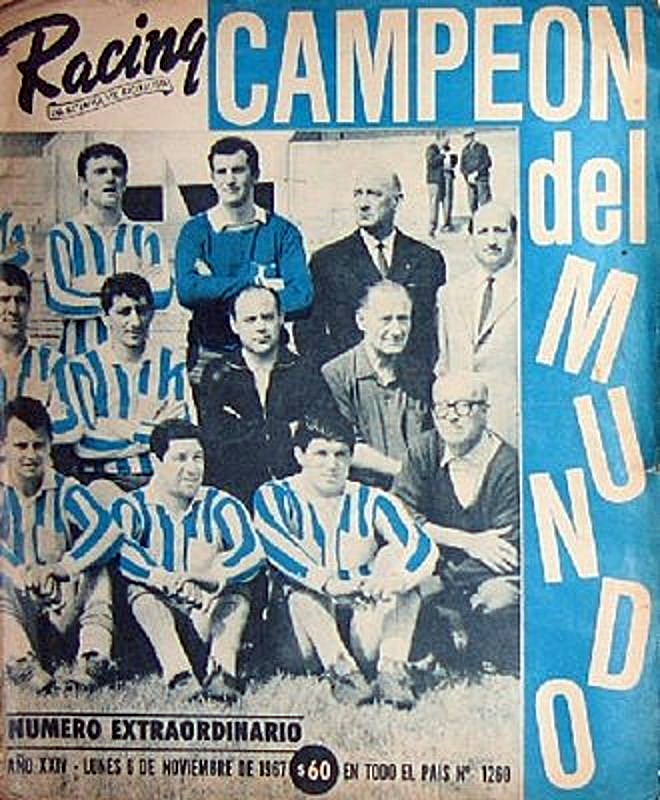
The tone was set in the first game at Hampden before an attendance of 83,437. Spitting, flailing elbows, hair pulls, play-acting, studs being dragged down the back of opponents’ legs and outrageous tackles largely formed Racing’s armoury.
A double-challenge on Jimmy Johnstone (the second came in as he was already grounded from the first tackle) still causes the viewer to wince today.
Jock Stein’s side had won the ferocious first leg at Hampden Park 1-0 thanks to Billy McNeill’s leaping header. The match in Glasgow was marred in controversy as Racing Club players kicked and spat the European Cup winners but could not stop Stein’s immortals on the park who flew to South America just needing to avoid defeat.
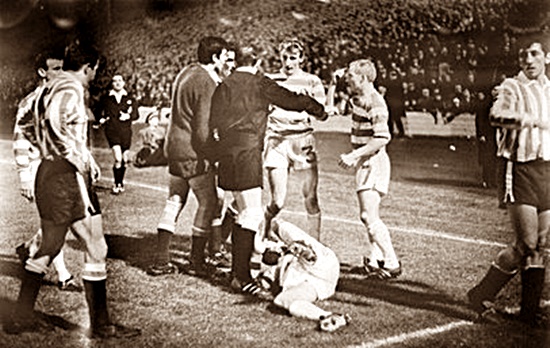
Confidence was high amongst Celtic’s ranks as they had come off the back of defeating Dundee in the Scottish League Cup final four days prior. Domestic dominance had been run of the mill for Celtic in the late sixties, and despite competing in a national cup final, Stein and the players had one eye on the clash with Racing Club. Meanwhile, the Hoops opposition had not only lost four successive matches heading into the battle with Celtic but had failed to score in any of those games.
Celtic had requested a 10-day break to the Scottish Football League Association in order to prepare for the second leg in Argentina. Initially agreeing, events changed, and the Hoops ended up having to fulfil their league fixture with Motherwell in Glasgow’s East End on 24 October which was followed by the League Cup final at Hampden a few days later.
Therefore, the highly anticipated encounter with Racing Club had been Celtic’s third competitive match in the space of 10 days. No time for celebration post-Dundee, Stein’s focus quickly shifted to the second leg against the Argentinians.
A party of 18 players flew out on an Aerolineas Argentina Jet from Prestwick via Paris and Madrid with the Celtic players and staff boarding a long-haul 20-hour light. For the 106 dedicated supporters who travelled, their journey was slightly longer.
The 7000-mile trip to South America stopped in the Canary Islands, then Sal in the Cape Verde Islands, before making the short trip to Recife in Brazil which finished off in Buenos Aires. Not only was it a crazy 29-hour journey, but it was also a costly one too. At £200 per person, match tickets were priced at a feasible rate of eight quid.
2.
120,000 hostile fanatics crammed into the El Cilindro
Before the match, Stein had to make a drastic late change to his starting XI. With 120,000 hostile fanatics crammed into the El Cilindro, Ronnie Simpson had been struck by an object which split his head open along the top. Various historians in the past have said that it was a piece of medal, a stone or indeed a bottle that hit Simpson, although it is not definitive of what connected with the Celtic goalkeeper. John Fallon had to replace Simpson as a result.
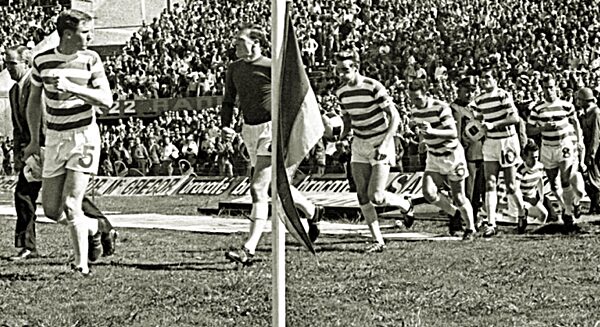
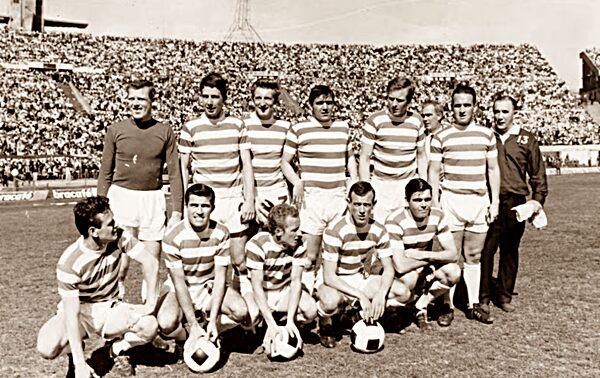
Racing engaged in the same intimidatory tactics as the first game and a number of Celtic players left the pitch carrying injuries after a 2-1 defeat. (Jimmy Johnstone had to take a shower at half time to wash all the spit from his hair that his markers had kindly donated). There were serious misgivings among Celtic directors about the wisdom of taking part in a play-off game to decide a winner.
Personnel wise, Jimmy Johnstone was available to play. Under a 21 day domestic suspension, the SFA caved in and allowed Jinky to compete in the World Club Championships. A major reason for this was because Racing Club star Humberto Maschio had been in the exact same position, but the Argentinian Football Association allowed him to compete in games against Celtic.
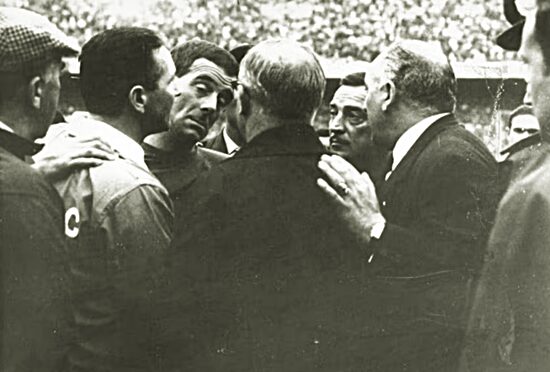
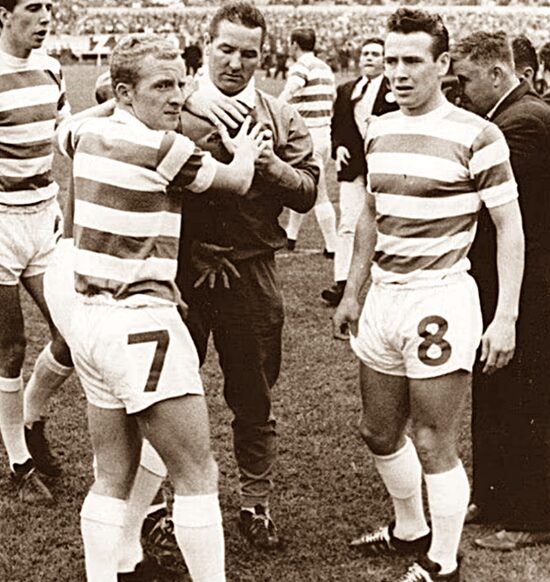
The Intercontinental Cup was not overseen by FIFA therefore it was up to respective associations to decide whether suspended players could play or not.
Officiated by Uruguayan Esteban Marino, the second leg was played in a less chaotic spirit than the first. Racing Club players had also abandoned their park the bus approach and decided to attack Celtic [not literally this time} which made it an open encounter.
Despite Tommy Gemmell’s early penalty, the Argentinians fought back, equalising through Norberto Raffo’s header.
Jaun Carlos Cardenas quickfire strike after the restart was the games winning goal. Subsequently, no champion was crowned on the night due to no away goals rule and a third match had to take place.
However, a debate between Stein and Celtic’s hierarchy around whether to play a third game ensued.
3.
The Hoops dressing room had been attacked by Argentinian supporters after the match which quite rightfully enraged Stein. All the while, fighting broke out outside the stadium between Racing Club fans and Uruguayans who had made the journey to Buenos Aires to support Celtic. It all became a tad mental.
Chairman Bob Kelly was insistent on flying home as he did not want to play a third World Club Championship tie. But, Secretary Desmond White, alongside fellow board member James Ferrell wanted to compete in a third contest which was to be played in Montevideo, Uruguay.
Celtic should have listened to Chairman Bob Kelly
Displeased with actions both on and off the park, Jock Stein told reporters that, “we don’t want to go to Montevideo or anywhere else in South America, for another game. But we know we have to.”
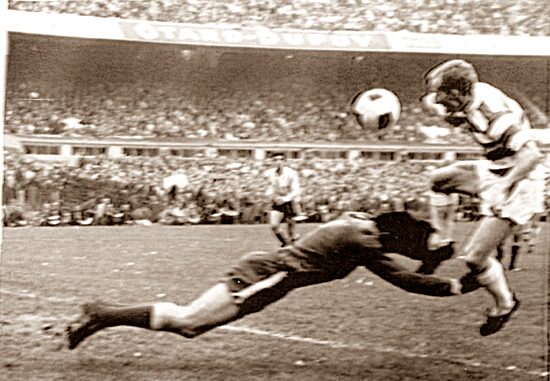
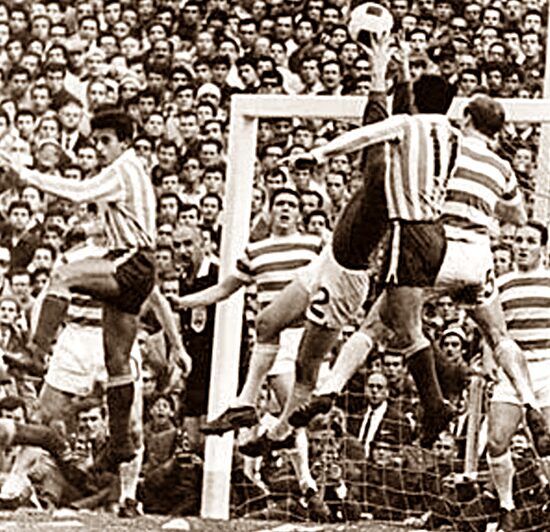
Reluctantly, the two teams would face off against each other three days later. Sadly, Celtic would go onto lose the final match 1-0. In the play-off tie the Celtic players had clearly had enough of their Argentinian opponents and decided to take their revenge.
Jock Stein, although outraged at the outcome, had some sympathy for his team: ‘Even the Archangel Gabriel would have retaliated.’
The upshot was four red cards for Celtic (although Bertie Auld ignored the referee’s dismissal and played on!) and two for Racing.
One Uruguayan newspaper headline read: ‘ A War in Montevideo: No Winners, only Survivors!!!
Epilogue
Celtic’s hard-earned reputation for sporting play was in tatters – and the title of World Champions was lost. Racing won in Montevideo by a single goal (a wonder strike from Juan Carolos Cardenas which gave substitute goalie John Fallon no chance). Every member of the Celtic team was subsequently fined by the club for their misconduct. Five decades on, surviving Celtic players remain embittered about their trip to South America and Racing’s tactics:
‘
They were more than sleekit. It was just badness. Sheer evil. Argentina were robust at Wembley the year before, but that was nothing compared to Racing Club. They would have been happier to play without a ball.’ – Bertie Auld
106 Celtic fans took a chartered flight to Argentina for the 14,000-mile round journey at a cost of £200 each (almost £3,500 in today’s money).
They – and the thousands of supporters back home who had to make do with delayed TV and newspaper reports to find out the score – felt cheated.
All sorts of oaths and curses were uttered in anger at Racing Club, known throughout Argentina as La Academia (The Academy). Yet there was one curse in particular which was to prove enduring and damaging in equal measure . . .
Source: Selection of Scottish various online news!
Publication date on this page: June 21, 2025
_____________________________
Sports Vision +Plus / Champions Hour in activity since 2013
Discover more from Sports Vision +
Subscribe to get the latest posts sent to your email.


